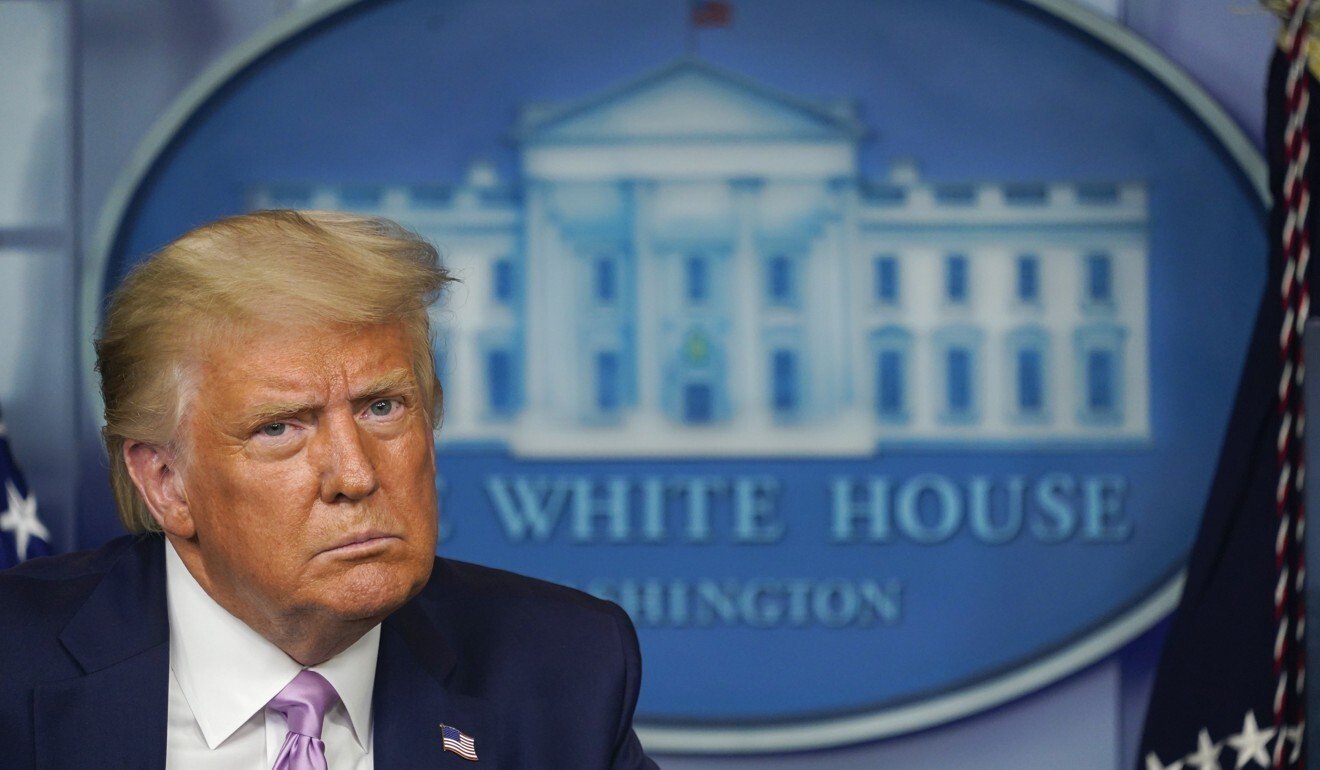Further US sanctions against the city’s financial institutions – one possible outcome of a report due on Monday – would have adverse effects for businesses, but possibly also for Trump’s re-election.
Hong Kong’s trading and manufacturing firms could have a more difficult time in the coming months if the United States were to impose sanctions on banks, the city’s business leaders warned on Sunday.
But local lawmakers and business leaders also questioned whether US President Donald Trump would roll out such punitive measures, as it could also affect American businesses – with potentially adverse effects on his re-election bid.
The Trump administration is facing a deadline on Monday to identify, in a report to the US Congress, individuals who facilitated the “erosion” of Beijing’s obligations under Hong Kong’s mini-constitution, the Basic Law, as well as the financial institutions that do business with them.
Trump issued an executive order on July 14 ending Hong Kong’s special economic status, while the US government enacted the Hong Kong Autonomy Act to punish officials accused of curbing the city’s autonomy, as well as banks who engaged in “significant transactions” with anyone named in the report. The State Department has 90 days to designate them, after which banks will have 12 months to end all business relations.

HSBC, Standard Chartered and other financial institutions in Hong Kong will be watching the report closely as they could potentially face sanctions themselves.
Michael Hui Wah-kit, vice-president of the Hong Kong Chinese Importers’ and Exporters’ Association, said he believed that if Washington were to target financial institutions, its options included imposing fines, or restrictions on their use of the US dollar.
“If some banks were targeted, it will be more inconvenient for local companies to do business, especially with American counterparts, through these institutions. Local firms will have to open new accounts in other banks,” he said.
Herman Hu Shao-ming, a vice-chairman of the Chinese General Chamber of Commerce of Hong Kong, also warned that punitive measures on the financial sector would deal another blow to the city’s manufacturing and trading firms.
“Christmas was originally a busy season, but Hong Kong businesses are already very frustrated because many foreign buyers, especially those American department stores, are suffering under the coronavirus pandemic,” he said.
“When the financial sector sneezes, the city catches a cold. A lot of people in the commercial and industrial sector are making preparations and moving money away from American banks.”
Eddy Li Sau-hung, president of the Hong Kong Economic and Trade Association, a non-governmental organisation that studies the city’s relationship with the mainland, agreed that US sanctions could be another piece of bad news for local companies.
“Hong Kong manufacturers needs to pay more attention to the market in Southeast Asia and mainland China,” he said.
“When countries like India, Vietnam and Bangladesh were under lockdown, mainland Chinese factories got back to work. They are helping many countries in dealing with the pandemic.”
However, banking sector lawmaker Ronick Chan Chun-ying said it was unlikely for Trump to impose sanctions on financial institutions before the presidential election on November 3.
“If Washington imposes restrictions on deals with US companies, or using the US dollar … targeted banks will be stricter in working with their clients, as well as with other banks,” he said.
“The impact of such policies could be beyond one’s imagination … Trump is betting on the financial market for his re-election bid. When the market is so fragile, he is not generally expected to target banks and financial institutions.”
Pro-establishment lawmaker Jimmy Ng Wing-ka, who represents the Chinese Manufacturers’ Association of Hong Kong, said he also believed that Trump would not impose further sanctions in the near future as Hong Kong remains an important hub in US-China trade.
“If Trump sanctions us again, where are the American’s agricultural products supposed to go to? Many of Trump’s supporters are farmers – he will lose their votes,” he warned.
Lau Siu-kai, vice-chairman of the Chinese Association of Hong Kong and Macau Studies, a semi-official think tank based in Beijing, added that if Joe Biden won the presidential election, Washington would be more concerned about protecting the interests of American companies in Hong Kong and elsewhere.
“But the US will continue to keep its hostile and tough policy on Hong Kong and China,” Lau said.
In August, the US government imposed sanctions on Hong Kong leader Carrie Lam Cheng-Yuet-ngor, and 10 other local and mainland Chinese officials, as punishment for their roles in the enforcement of the city’s sweeping new national security law on June 30.
Besides Lam, Washington also targeted five current Hong Kong officials, including the city’s justice, security, mainland affairs and police chiefs, as well as the director of the Chief Executive’s Office.
Asked if he was concerned about further sanctions from the US, a spokesman for security minister John Lee Ka-chiu said the secretary would not comment on the impacts the US sanctions had on him.
“[The secretary for security] would like to stress that the so-called sanction by the US would be futile,” he said.
In response to a similar question, a spokesman for Secretary for Justice Teresa Cheng Yeuk-wah also said the secretary would not comment on the impacts of the “so-called sanction”.
“The secretary will not be intimidated with the strong support from China. The purported threats of the United States are to no avail.”















